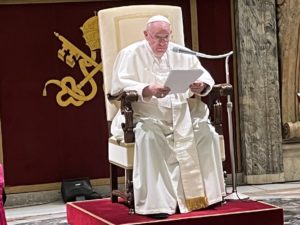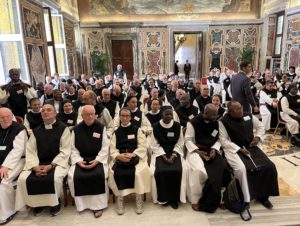Trappist Superiors meet with Pope Francis

As part of the Trappist General Chapter held in Assisi, Italy, on September 16 the Abbots & Abbesses made the trek to Rome to attend a Papal Audience with Pope Francis. Dom Bernardus, the newly elected Abbot General, had opened this year’s General Chapter by inviting all the Superiors of our Order to share their dreams. The Pope spoke to the assembled Superiors about spoke about the importance of dreams. The English text of the Pope’s talk is below:
Pope’s talk, Rome, September 16, 2022
Dear brothers and sisters, good morning and welcome!
I thank the Abbot General for the words of greeting and introduction. I know that you are carrying
out the second part of your General Chapter, at the Porziuncola of Santa Maria degli Angeli: a
place so rich in grace that it surely has helped to inspire your days.
I rejoice with you for the success of the first part of the Chapter, held in the same place, during
which the new Abbot General was also elected. You, Father, immediately set out to visit the twelve
regions where your monasteries are located. I like to think that this “visitation” took place with
the holy care shown to us by the Virgin Mary in the Gospel. “She got up and went quickly” says Luke
(1:39), and this expression always deserves to be contemplated, in order to be able to imitate it,
with the grace of the Holy Spirit. I like to pray to Our Lady who is “in a hurry”: “Lady, you are
in a hurry, aren’t you?”. And she understands that language.
The Father Abbot says that on this trip he “collected the dreams of the superiors”. I was struck by
this way of expressing himself, and I wholeheartedly share it. Both because, as you know, I too
mean “dreaming” in this positive sense, not utopian but planning; and because here it is not a
question of the dreams of an individual, even if the superior general’s, but of a sharing, of a
“collection” of dreams that emerge from the communities, and which I imagine are the object of
discernment in this second part of the Chapter.
They are summarized in this way: a dream of communion, a dream of participation, a dream of mission
and a dream of formation. I would like to offer you some reflections on these four “paths”.
First of all, I would like to make a note, so to speak, of method. An indication that comes to me
from the Ignatian approach but which, basically, I believe I have in common with you, men called to
contemplation at the school of Saint Benedict and Saint Bernard. In other words, it is a matter of
interpreting all these “dreams” through Christ, identifying ourselves with him through the Gospel
and imagining – in an objective, contemplative sense – how Jesus dreamed of these realities:
communion, participation, mission and formation. Indeed, these dreams build us up as persons and as
communities to the extent that they are not ours but his, and we assimilate them through the Holy
Spirit. His dreams.
And here, then, opens up the space for a beautiful and gratifying spiritual search: the search for
the “dreams of Jesus”, that is, for his greatest desires, which the Father aroused in his divine-
human heart. Here, in this key of evangelical contemplation, I would like to put myself in
“resonance” with your four great dreams.
The Gospel of John gives us this prayer of Jesus to the Father: «The glory that you have given to
me, I have given to them, so that they may be one as we are one. I in them and you in me, so that
they may be perfect in unity and the world may know that you sent me and loved them as you loved
me» (17:22-23). This holy Word allows us to dream with Jesus the communion of his disciples, our
communion as “his” (see Ap Ex Gaudete et exsultate, 146). This communion – it is important to
specify – does not consist in our uniformity, homogeneity, compatibility, more or
less spontaneous or forced, no; it consists in our common relationship to Christ, and in Him to the
Father in the Spirit. Jesus was not afraid of the diversity that existed among the Twelve, and
therefore we do not have to fear diversity either, because the Holy Spirit loves to arouse
differences and make them a harmony. Instead, our particularism, our exclusivism, yes, we must fear
them, because they cause divisions (see Ap Ex Evangelii gaudium, 131). Therefore, Jesus’ own dream
of communion frees us from uniformity and divisions, both of which are ugly.
We take another word from the Gospel of Matthew. In controversy with the scribes and Pharisees,
Jesus says to his disciples: «As for you, do not be called ‘Rabbi.’ You have but one teacher, and
you are all brothers. Call no one on earth your father; you have but one Father in heaven. Do not
be called ‘Master’; you have but one master, the Messiah» (23:8-10). Here we can contemplate Jesus’
dream of a fraternal community, where everyone participates on the basis of a common filial
relationship with the Father and as disciples of Jesus. In particular, a community of consecrated
life can be a sign of the Kingdom of God by witnessing a style of participatory fraternity between
real, concrete people who, with their limitations, choose every day, trusting in the grace of
Christ, to live together. Even current communication means can and must be at the service of real –
not just virtual – participation in the concrete life of the community (see Ap Ex Evangelii
gaudium, 87).
The Gospel also gives us Jesus’ dream of an all-missionary Church: «Go, therefore, and make
disciples of all nations, baptizing them in the name of the Father, and of the Son, and of the Holy
Spirit, teaching them to observe all that I have commanded you. And behold, I am with you always,
until the end of the age» (Mt 28:19-20). This mandate concerns everyone in the Church. There are no
charisms that are missionary and others that are not. All charisms, insofar as they are given to
the Church, are for the evangelization of the people, that is, missionary; naturally in different,
very different ways, according to God’s “fantasy”. A monk who prays in his monastery does his part
in bringing the Gospel to that land, in teaching the people who live there that we have a Father
who loves us and, in this world, we are on our way to Heaven. So, the question is: how can a person
be a Cistercian of strict observance and a part of “an outgoing Church” (see Ap Ex Evangelii
gaudium, 20)? You are on the way, but it is a way out. How do you live the “sweet and comforting
joy of evangelizing” (St. Paul VI, Ap Ex Evangelii nuntiandi, 75)? It would be nice to hear it from
you, contemplatives. For now, it is enough for us to remember that “in any form of evangelization
the primacy is always of God” and that “in the whole life of the Church it must always be shown
that the initiative is of God, that ‘it is he who loved us’” (1Jn 4:10)” (see Ap Ex Evangelii
gaudium, 12).
Finally, the Gospels show us Jesus who takes care of his disciples, educates them patiently,
explaining to them, on the sidelines, the meaning of some parables and illuminating with words the
testimony of his way of life, of his gestures. For example, when Jesus, after washing the
disciples’ feet, says to them: “I have given you an example so that you too may do as I have done
to you” (Jn 13:15), the Master dreams of the formation of his friends according to the way of God,
which is humility and service. And then when, shortly after, he affirms: “I still have many things
to say to you, but for the moment you are unable to bear the burden” (Jn 16:12), Jesus makes it
clear that the disciples have a path to follow, a formation to receive; and he promises that the
Formator will be the Holy Spirit: “When he comes, the Spirit of truth, he will guide you to all
truth” (16:13). And there could be many evangelical references that attest to the dream of
formation in the heart of the Lord. I like to summarize them as a dream of holiness, renewing this
invitation: “Let the grace of your Baptism bear fruit in a journey of holiness. Let everything be
open to God and, to this end, choose Him, choose God always anew. Do not be discouraged,
because you have the strength of the Holy Spirit to make it possible, and holiness, after all, is
the fruit of the Holy Spirit in your life (see Gal 5:22-23)” (see Ap Ex Gaudete et exsultate, 15).
Dear brothers and sisters, I thank you for coming and I hope you conclude your Chapter in the best
possible way. May Our Lady accompany you. I cordially bless you and all your confreres
around the world. And I ask you to please pray for me.
